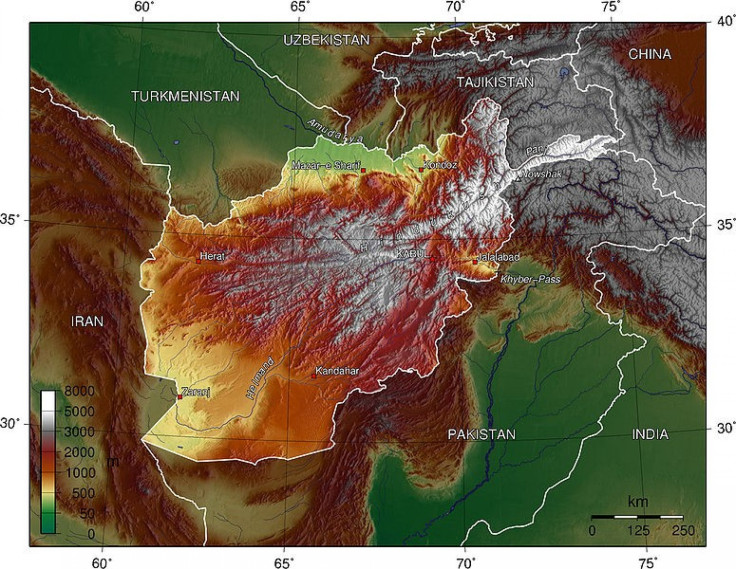Marine Desecration Video - A New Abu Ghraib?
ANALYSIS

(REUTERS) - A video appearing to show U.S. Marines urinating on the bodies of dead Taliban fighters promises to become an enduring memory of the Afghan war and is already drawing sharp reaction from across the world as it goes viral on the Internet.
But experts inside and outside the U.S. military are so far unconvinced the incident will cause as much damage as Iraq's Abu Ghraib prisoner abuse scandal did, even as it stirs anti-American sentiment and revives questions about why some American troops appear prone to committing abuses -- and then proudly documenting them.
Like in the 2004 Abu Ghraib prisoner abuse scandal, in which U.S. troops photographed themselves humiliating and intimidating detainees, the Americans shown in the Marine video appeared to have wanted a record of themselves desecrating the corpses of the men they had just killed.
Cracking jokes, like have a great day, buddy, as they urinate on the dead, they are aware the video is being taken. Near the end of the clip, one of the Americans seeks to confirm that the video caught everything.
Yup, a colleague answered, apparently a Marine from the same North Carolina-based unit. That casual exchange, and others, are part of what make the images so disturbing.
Reuters has been unable to verify that the dead men were indeed Taliban fighters, but the Marines said the video appeared to depict several dead Taliban.
The issue here, like Abu Ghraib, is that you have vivid pictures ... and that is what is so damaging, said John Ullyot, a former Republican spokesman for the Senate Armed Services Committee during the Abu Ghraib hearings.
Still, Ullyot, who is also a former Marine officer and scout sniper platoon commander based out of Camp Lejeune in North Carolina, said the big difference between Abu Ghraib and the Marine video was that Abu Ghraib demonstrated a systematic pattern of abuse authorized at higher levels.
(Abu Ghraib) was much more reflective of a policy of allowing abuse, whereas this seems to be on its face way out of line with training, Ullyot said.
The Pentagon, sensing the need to respond quickly, roundly condemned the incident, with Defense Secretary Leon Panetta promising to dole out punishment to whoever was responsible -- even before its investigation of the incident was complete.
Afghan President Hamid Karzai condemned the video, describing the men's actions as inhuman, but the Taliban said it would not harm nascent efforts to broker peace talks.
INCIDENT APPEARS ISOLATED
It is unclear whether the uproar surrounding the Marine video will escalate further in the United States and abroad, after the initial flurry of activity. The news story has figured prominently in U.S. media but it is being overshadowed partly by news surrounding the 2012 presidential campaign and this week's Republican primaries.
All of those are factors mitigating it from becoming a big American story, said Steven Livingston, a professor at the School of Media and Public affairs at George Washington University.
For a lot of Americans ... Afghanistan and Iraq are long forgotten. ... So all of those are factors mitigating this from becoming a big American story.
Still, Livingston stressed that reaction may be different abroad. The story figured prominently on al Jazeera's English-language website and was among the main stories on its Arabic site as well. The video is certain to deepen concerns in the Muslim world about U.S. troops fostered by a series of controversial videos and photographs.
Those include WikiLeaks' release of a classified gunsight video showing a 2007 U.S. helicopter attack that killed a dozen people in Iraq, including two Reuters journalists, and the disclosure that U.S. soldiers killed unarmed civilians in Afghanistan's Kandahar province in 2010.
In that case, photographs published in March by two magazines - Der Spiegel and Rolling Stone - showed soldiers posing with the bloodied corpse of an Afghan boy they had just killed. The images can be seen here: here
In Afghanistan, where news spreads more slowly, it could take time to assess the fallout from the latest Marine video, observers say. Only a minority of Afghans have access to electricity and the Internet is limited to a tiny urban elite.
Anti-American feeling has boiled over, or been whipped up, into violence several times in Afghanistan in recent years. Protests over reports of the desecration of the Muslim holy book twice sparked deadly riots.
One U.S. official, speaking on condition of anonymity, said it was too soon to tell but he did not expect the incident to reach Abu Ghraib proportions, at home or abroad, because the abuse appeared isolated.
Still, in the coming days and weeks, the U.S. military will be asked to explain how those forces could possibly think they could escape punishment after committing such abuses and documenting them in a video.
Marines are given training about the rules of war and observers in the Pentagon privately questioned whether the problem was not also a lack of common sense among a generation accustomed to living in a world where images become public on the Internet.
Most of the reaction on military-related websites was astonishment.
Having buried friends, killed the enemy and listen to wounded friends scream for help I understand where they're coming from emotionally, one reader wrote, commenting on an article published on the Marine Corps Times website.
However, this is completely stupid and embarrassing for anybody in a uniform. It's nasty. Once again like I've said before. If you're going to do something stupid make sure there is no record of it.
(Additional reporting by Thomas Ferraro.)
© Copyright Thomson Reuters 2024. All rights reserved.











